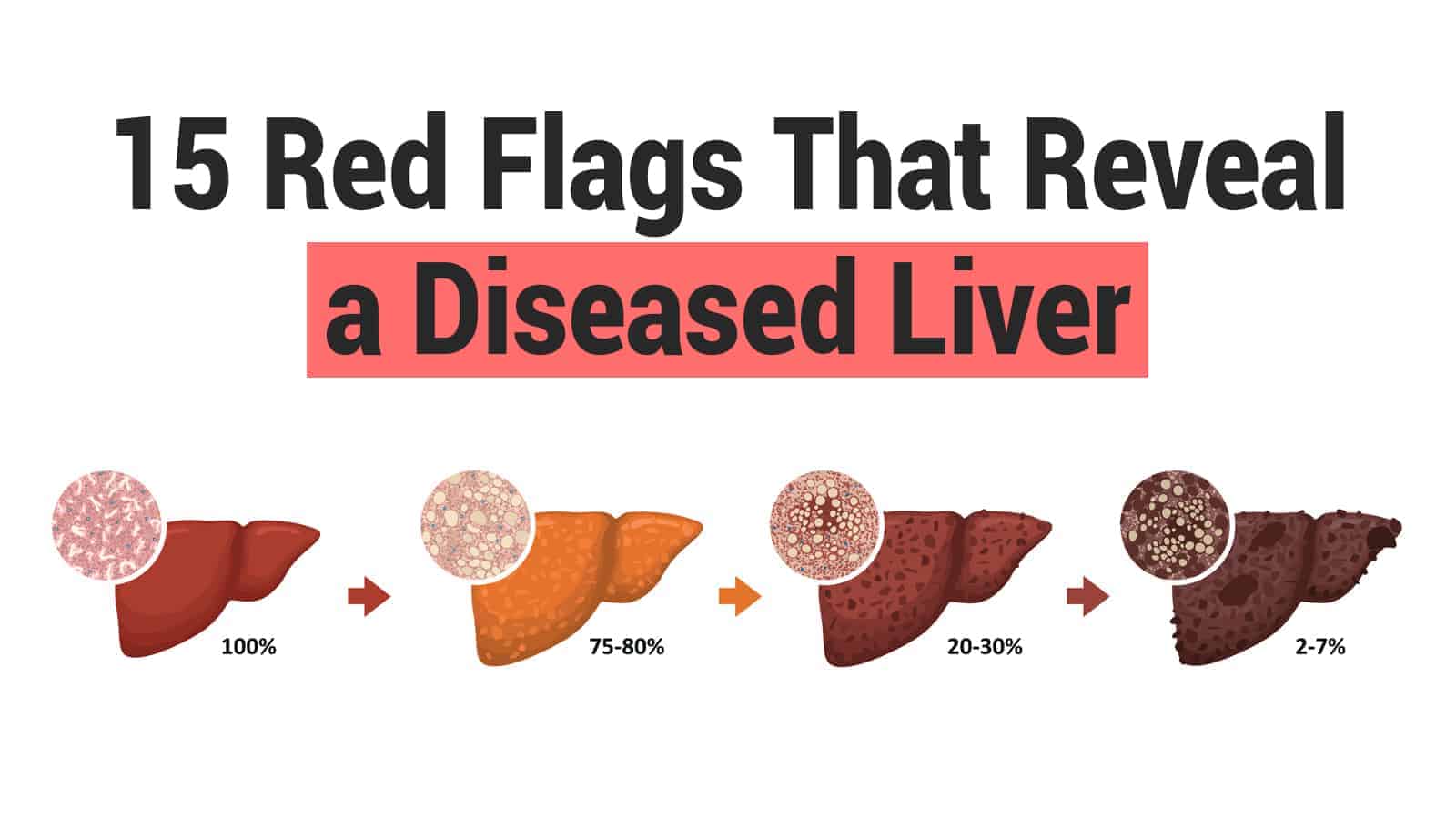Your liver is the largest organ in your body. The size of a football, your liver keeps you healthy through its many functions. But if your liver gets diseased, it can be life-threatening. Here are 15 red flags that reveal you could have a diseased liver.
What does your liver do?
It sits just under your ribs, on the right side of your stomach. Your liver filters your blood that’ coming from your digestive system before it goes to the rest of your body. It also removes chemicals and metabolizes drugs you take. The bile secreted by your liver goes back into your intestines, where it’s eventually removed as waste. Your liver also does these five things for your body.
- Produces bile
- Removes bilirubin, cholesterol, drugs, and hormones
- Activates your enzymes for metabolism
- Stores glucose, minerals, and vitamins
- Helps your blood clot properly
Diseases in the liver
 Some liver problems can be inherited from your parents, others can be caused by viruses. Some liver ailments go away over time, but others can turn into very serious illnesses leading to death if they aren’t treated properly.
Some liver problems can be inherited from your parents, others can be caused by viruses. Some liver ailments go away over time, but others can turn into very serious illnesses leading to death if they aren’t treated properly.
Fatty liver disease
This liver disease can affect kids and adults. Your liver contains very little fat. But if fat builds up in your liver’s cells, it causes swelling and eventually damage. The excess fat can lead to cirrhosis, cancer of the liver, and sometimes liver failure. Studies show that in the last decade, about 30% to 40% of Americans have fat in their liver. Overindulging in too much alcohol can also cause a fatty liver, but the biggest problem today is obesity. Being overweight can cause your liver to build up fat.
Lifestyle changes are the best way to avoid fatty liver disease. Lose extra weight, eat a healthy diet, and exercise regularly. Doctors suggest that even losing as little as 5% to 8% of your body weight to help reverse liver damage.
Viral hepatitis
Another common liver disease is viral hepatitis caused by five different hepatitis: A, B, C, and D depending upon the type of infection. Only 20% of all people in the world are affected by a hepatitis virtual infection, but the numbers are growing. In the United States, the most common viral diseases are A, B, and C.
You get exposed to hepatitis A and E through contaminated water or food. Other hepatitis viruses are passed by unsterile injections, coming in contact with blood, or other body fluids. Hepatitis B, C, and D are spread through sexual contact. Because those who have hepatitis don’t show any symptoms, they can spread the disease without realizing it.
If you get viral hepatitis, it can be treated with medication. Hepatitis A, B, and D are preventable if you get a vaccination. Other ways to prevent hepatitis include these precautions:
- Washing your hands
- Avoid contact with infected blood
- Not eating contaminated foods or water
- Avoiding drugs that can cause liver damage like too much acetaminophen (Tylenol), NSAID (Ibuprofen), and aspirin. It’s the most common cause of sudden liver failure.
- Stay at a healthy weight
- Exercise
- Limit your alcohol
- Eat a plant-based diet, consisting of organic foods, whole grains, fruits, vegetables, nuts, and seeds.
15 red flags that reveal you have a diseased liver
Liver disease can show up without much warning. Often there are little to no symptoms at first, so it’s easy to miss. Here are symptoms to look for.
1 – Jaundiced skin and whites of your eyes
Jaundice is the yellowing of your skin or eyes. The yellow is due to a high level of bilirubin, a yellow-orange color of bile.
2 – Abdominal pain and swelling
Fluid builds up in your stomach due to liver disease is called ascites. It’s one of the first symptoms of liver failure and advanced liver disease. This causes your stomach to swell and look big. You may feel like you can’t breathe, too.
Symptoms of ascites include:
- Trouble breathing
- Hernia
- Fluid in the chest
- Infection
- Discomfort in the swollen stomach area
3 – Swelling in the legs and ankles
Edema is the buildup of fluids in your body tissues. When your small blood vessels start to leak fluids and it builds up in the surrounding areas. You may have a puffy face, legs, ankles, and feet if you have chronic hepatitis. Some people get stretched, shiny skin, or pitted skin where the fluids have collected. If you have mild edema, it may go away, and your doctor can give you a diuretic to help your body flush out the fluids.
4 – Joint pain
Hepatitis C activates your immune system to attack the viral infection. Because your immune system is hyped up, it causes joint and muscle pain which in turn increases your chance of getting more inflammation in your joints, making them hurt even more.
5 – Dark urine
If you suffer from hepatitis, your urine may turn a dark yellow almost orange color. This happens because of bilirubin being excreted through your kidneys. The high amounts of bilirubin can cause inflammation to your liver and sometimes a blockage of the bile ducts.
6 – Pale stool color
One red flag that reveals a diseased liver is clay-colored stools. Normal bile is a brown color due to bile salts, but when you have a liver infection, the production of bile gets blocked. This makes your skin turn yellow and your stools look pale, like clay.
7 – Chronic fatigue
If you’re fighting a liver infection, you may feel fatigued. Plus, if your liver isn’t functioning properly, you will also feel tired and listless.
8 – Nausea
Hepatitis causes fluid to build up in your stomach so you feel nausea. Also sometimes bile ducts get blocked, which may cause you to feel nauseous and not like eating.
9 – Low-grade fever
If you have hepatitis, you may feel as if you have the flu with nausea, tiredness, achy, and loss of appetite. You may get a low-grade fever due to the infection because your immune system kicks in to fight off the infection.
10 – A tendency to bruise easily
If you have advanced hepatitis C, you will bruise and bleed easily. Some of this is due to the slow production of platelets that help your blood clot properly. In extreme cases, your nose, gums can start bleeding and you’ll have blood in your urine.
11 – Diarrhea
Hepatitis B and A sometimes causes nausea, abdominal pain, and diarrhea. These symptoms can develop slowly over time, eventually leading to jaundice and other symptoms.
12 – Loss of appetite
Studies found that loss of appetite is one of the main symptoms of chronic liver disease. It’s unclear what causes the lack of a desire for food, but it may be that foods don’t taste normal.
13 – Malaise feeling
Doctors define malaise as the feeling of something being “off.” If you have liver disease, you may not feel quite right, but you are unable to put your finger on what’s wrong. You may feel extremely tired or sleepy.
14 – Bad breath
Another red flag that reveals a diseased liver is musty or sweet-smelling breath. This means your liver isn’t filtering out toxic chemicals and substances in your blood. Sulfur builds up in your bloodstream, making its way to your lungs. So you emit a strong odor when you exhale air.
15 – Itchiness
Pruritus is another word for the itchiness you may feel if you have hepatitis. If you have cirrhosis, you may get pruritus because of the toxins that build up in your body since your liver isn’t working completely. So, the toxins accumulate in our bloodstream causing jaundice and itchiness. The itchiness can keep you awake at night. You may feel itchy in your feet and hands.
Some people even feel as if their internal organs are itchy. Doctors report that the itching is so severe that patients report feeling suicidal. Your doctor can give you some medication to stop the itchiness.
 Final Thoughts: See Your Doctor Immediately if You Have any Signs of a Diseased Liver
Final Thoughts: See Your Doctor Immediately if You Have any Signs of a Diseased Liver
Your liver keeps you healthy. If your liver gets infected or diseases, you may not know it at first. But over time, symptoms will begin to show up. You may feel like you have flu, become jaundiced, with a swollen stomach and fluid build up.
Eat healthy, exercise, and stay at a good weight to avoid a fatty liver, a huge problem right now in the United States as obesity continues to soar. If you travel overseas, be sure to get vaccinated to not get hepatitis. Limit your alcohol. All these things add up to having a healthy liver.


















